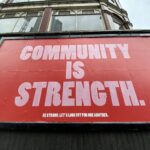“Black Lives Matter. Race matters. We need each other. What is mine to do?”
Fear of saying the wrong thing or being seen as a “racist” or someone who doesn’t “get race” has limited me as I have faced my discomfort along this journey of deepening my understanding of race. Recently, I realized that without knowing it, I had reached a tipping point where I was less uncomfortable and more likely to speak up about race and racism.
A big turning point on this journey happened decades ago when a consultant friend gave me some advice. I was suggesting to her that I was thinking of trying to convene people of different races and ethnic backgrounds so we could understand each other better. She asked me why people of color should be subjected to educating me and reliving their white-inflicted pain in order for me to learn. She suggested I get together with some white men and talk about our white male entitlement and privilege.
I was surprised by her response and the emotion behind it. I’ve been digesting her message ever since and I took her advice. I have deepened my respect of people of color and no longer expect everyone to agree to be my teacher. I have gotten comfortable with asking friends and colleagues if they are willing to have conversations about race and racial justice. I look for cues that indicate reticence or willingness.
Indeed, there are myriad ways for me to learn if I have a desire and am open to exploring ideas that seem foreign and make me uncomfortable. Many people like me grew up in all or mostly white communities. Some continue to live and work in mostly white worlds. No matter what life experiences we have faced, there are lots of ways to learn about race, racism and to work for a fairer and racially equitable world. One of the best ways I’ve found is from reading nonfiction and fiction written by African-Americans, other people of color and whites exploring the topic.
The New York Times bestseller list is full of nonfiction books about race relations in America. Among them, White Fragility provides a sociologist’s view of race, bias, discrimination and how racism is overtly and subtly reinforced by the white majority culture. A recent Facebook chat reminded me about the learning possible in reading fiction written by African-American writers as well. I have never intentionally done this. I think I have been too comfortable with my white authors. This lively exchange reminded me how much can be learned about the experience of African-Americans and other people of color from fiction. Authors cited in this discussion include Tayari Jones (American Marriage, Leaving Atlanta), Colson Whitehead (The Underground Railroad, The Nickel Boys), Edwidge Danticat (The Art of Death) or Patsy by Nicole Dennis-Benn. Black Lives Matter in their 4th of July message offered a list of 50 books written by people of color in the last five years from Huffington Post Black Voices.
In addition, for sure, there is YouTube and Netflix. Both provide endless opportunity to learn about race, racism and the challenge to advance racial equity in America.
The first step for each of us is to decide learning about race and racism is important, accept there will likely be discomfort, and be open to seeing different versions of “reality” and possibilities for change in ourselves and the systems and culture we support.
This post was first published on July 15, 2020.




Dear Tom,
I write on behalf of my wife Ranji who worked with you and came to know you after she retired from the World Bank. She said that you had a gentle demeanour that showed how much you cared about others. I am confident that your caring nature is what drove you to write this blog. I read all of them and know that I enjoyed every one of them. Keep being the Tom that Ranji knew and continue to give us your thoughts about making this world a happy place for all of us. Rudy
Thanks Rudy. You and Ranji are an inspiration to me and many in all the volunteer work you do in Sri Lanka, Orlando and any community you touch. You are examples of why there is so much hope and potential in our shared values and beliefs. Peace, Tom